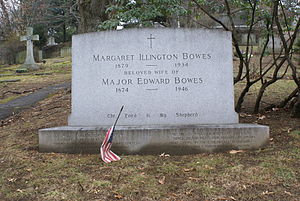- Edward Bowes
-
Edward Bowes (14 June 1874, San Francisco – 13 June 1946, Rumson, New Jersey) was an American radio personality of the 1930s and 40s whose Major Bowes' Amateur Hour was the best-known amateur talent show in radio during its eighteen-year run (1934-1952) on NBC Radio and CBS Radio.
Contents
Early life and radio career
Bowes made his first business success in real estate, until the cataclysmic San Francisco earthquake of 1906 wiped out his fortune. He then went to New York City, in search of other opportunities. He soon realized that the theatrical world was lucrative, and he worked busily in New York as a musical conductor, composer, and arranger. He also produced Broadway shows, such as Kindling in 1911-12 and The Bridal Path in 1913. He was married to Kindling star Margaret Illington, from 1910 until her death in 1934; her portrait by Adolfo Müller-Ury had been painted in 1906 for her first husband, the theatre manager, Daniel Frohman.
He became managing director of New York's imposing Capitol Theatre, which he ran with military efficiency and bearing. He insisted on being addressed as "Major Bowes". His nickname sprang from his earlier military rank, though historians are divided on whether he was an active-duty officer in World War I or held the rank as a member of the Officer Reserve Corps.
In 1934, Bowes brought his best-known creation to New York radio station WHN in 1934. He had actually hosted scattered amateur nights on smaller stations while manager of the Capitol. Within a year of its WHN premiere, The Original Amateur Hour —its original name, according to historian Gerald Nachman, was Major Bowes and His Capitol Family — began earning its creator and host as much as $1 million a year, according to Variety.
The rapid popularity of The Original Amateur Hour made him better known than most of the talent he featured. Some of his discoveries did become stars, including opera stars Lily Pons, Robert Merrill, and Beverly Sills; comedian Jack Carter; pop singer Teresa Brewer; and, Frank Sinatra, fronting a quartet known as the Hoboken Four when they appeared on the show in 1937.
The show consistently ranked among radio's top ten programs throughout its entire run. Bowes's familiar catchphrase, "...around and around she goes and where she stops nobody knows", spoken in the familiar avuncular tones for which he was so renowned, whenever it was time to spin its "wheel of fortune," the device by which some contestants were called to perform. In the early days of the show, whenever a performer was simply too terrible to continue, Bowes would stop the act by striking a gong (a device that would be revived in the 1970s by Chuck Barris's infamous The Gong Show). Bowes heard from thousands of listeners who objected to his terminating these acts prematurely, so he abandoned the gong in 1936.
Nachman recorded that Bowes, "a businesslike fellow with a mirthless chuckle who, unlike most emcees, had a gift for nongab," went out of his way to make contestants feel at ease, habitually taking them out to dinner before their appearances. Nachman also credits Bowes for featuring more black entertainers than many network shows of the time.
Death and legacy
 The grave of Major Edward Bowes in Sleepy Hollow Cemetery
The grave of Major Edward Bowes in Sleepy Hollow Cemetery
Major Bowes died on the eve of his 72nd birthday at his home in the New York suburb of Rumson, New Jersey.[1] The following week, his talent coordinator Ted Mack took over the hosting chores, first as the interim, and later as permanent host until Mack ended the series 24 years later, on September 27, 1970. As a measure of the affection attached to Bowes' name, the show continued to be called Major Bowes' Original Amateur Hour until the 1950-51 season, when it became simply Original Amateur Hour and in 1955 became Ted Mack and The Original Amateur Hour.
Major Bowes was referred to in Cab Calloway's "I Love to Singa" from the movie The Singing Kid (1936), and in the Dorothy Fields lyrics for "Never Gonna Dance" from the Fred Astaire/Ginger Rogers film Swing Time (1936).
Nineteen months after Bowes's death, on January 18, 1948, the program, with Ted Mack as host, debuted on the DuMont Television Network, ultimately running on all four major networks until 1970. The radio version, also with Mack, ran until 1952.
Quote
- All men are at heart critics. And, since time immemorial, they have always felt they can run the other fellow's show better than he can. It gives them a feeling of satisfaction to believe that they may have started someone on the road to success.--Edward (Major) Bowes, describing the appeal of Major Bowes' Original Amateur Hour.
External references
- Edward Bowes at the Internet Movie Database
- Gerald Nachman, Raised on Radio (New York: Pantheon Books, 1998)
External links
Categories:- American radio personalities
- American theatre managers and producers
- People from Rumson, New Jersey
- People from San Francisco, California
- 1874 births
- 1946 deaths
Wikimedia Foundation. 2010.
